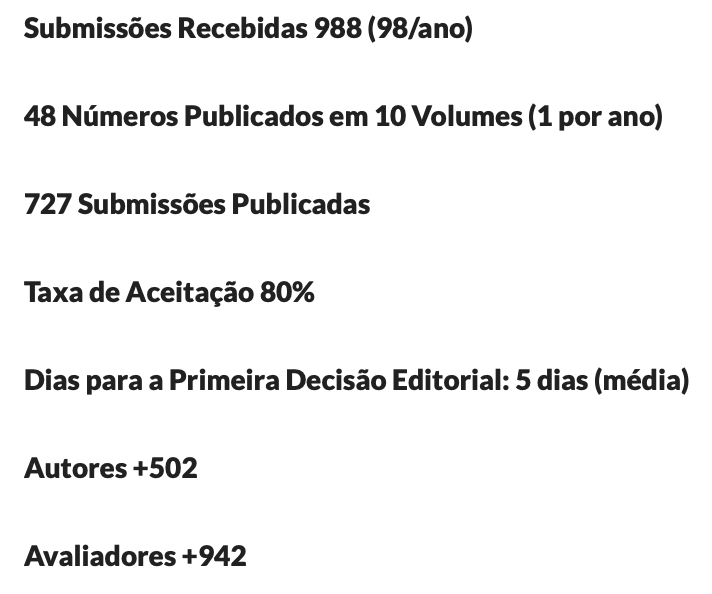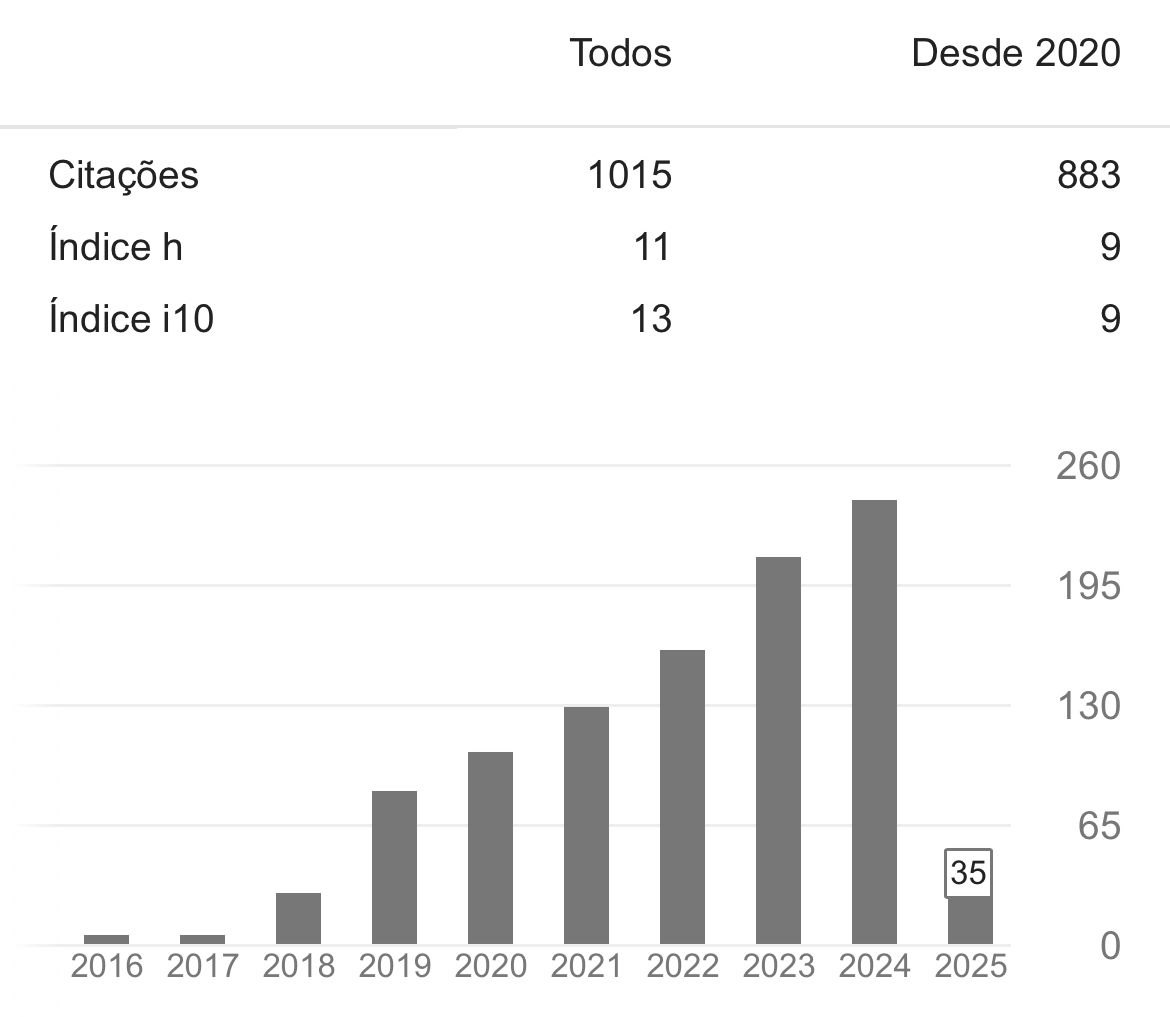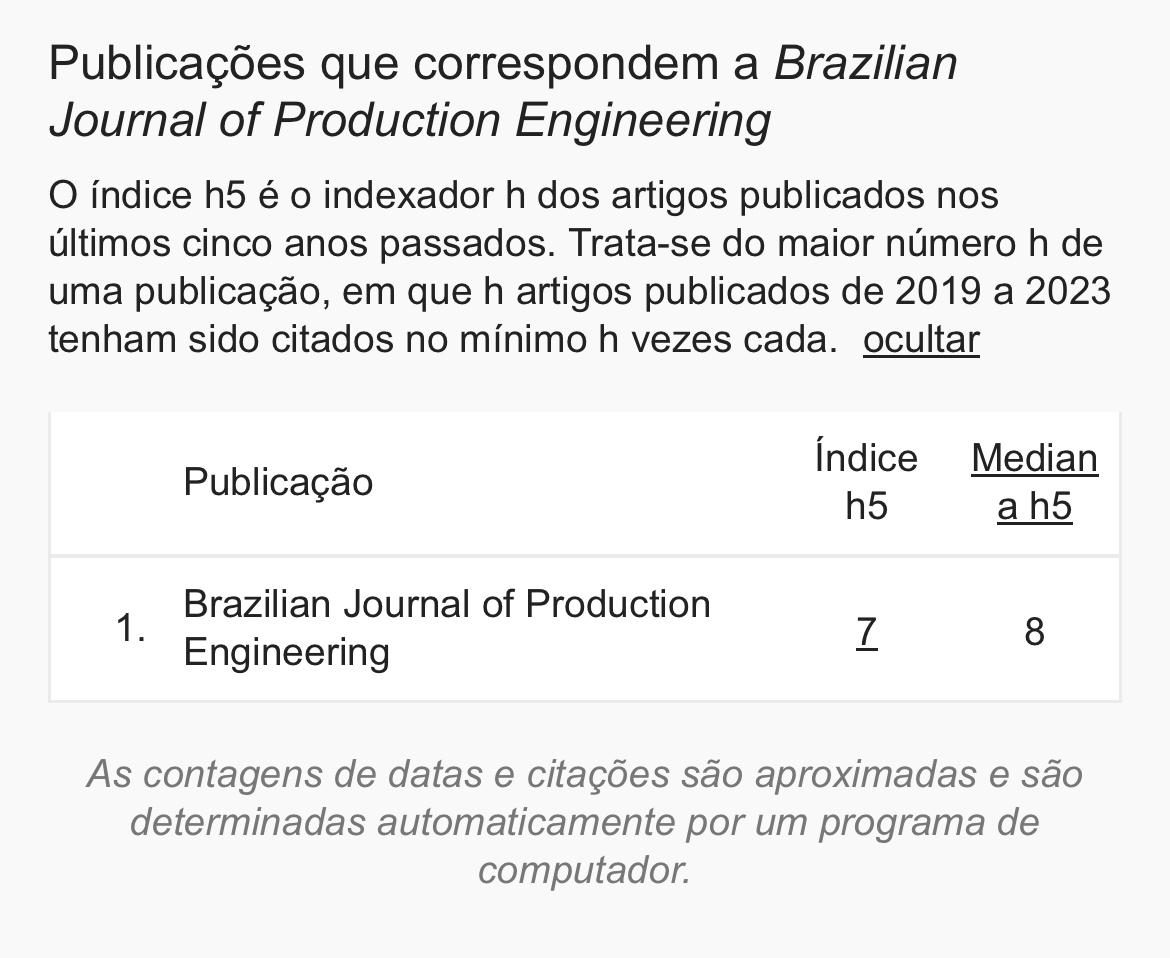Happiness at work, from the dimensions of well-being
Keywords:
happiness at work, well-being at work, psychological well-being, subjective well-beingAbstract
This paper aimed to explain, from well-being dimensions, which are the predictors of happiness at work and how they are manifested, in the perception of the employees of a service company, located in Minas Gerais. We aimed to fill an academic literature gap, once we did not find studies correlating the eudaimonic vision (psychological well-being) and the hedonic vision (subjective well-being) with the well-being at work, in order to characterize happiness at work.
We realized a descriptive and quantitative case study. Data were collected through a questionnaire with three scales for measuring Psychological Well-being, the Subjective Well-being and Well-being at work. We obtained a sample of 121 employees, with a confidence level of 95% and a sampling error of 5%. Data was analyzed by means of univariate statistics and structural equation modeling.
The results revealed that subjective well-being is positively correlated with psychological well-being that is positively correlated with well-being at work. This result partially confirms the proposed model.Well-being at work can be positively or negatively impacted, depending on individuals’ emotions and/or feelings. The greater the experience of positive feelings and the smaller of negatives feelings, the greater the well-being at work and, consequently, happiness at work. For future research, we suggest to investigate more deeply the relationship between BEP and BET, since we did not evidenced correlation between these constructs in this study, although this relation is postulated by the literature.
Downloads
References
Agapito, P. R., Polizzi F, A., & Siqueira, M. M. M. (2015, dezembro). Bem-estar no trabalho e percepção de sucesso na carreira como antecedentes de intenção de rotatividade. RAM, Revista de Administração Mackenzie, 16(6), 71-93. Recuperado de: <http://www.scielo.br/scielo.php?script=sci_arttext&pid=S1678-69712015000600071&lng =en&nrm=iso>. <http://dx.doi.org/10.1590/1678-69712015/administracao>.
Alberto, L. C. F. R. (2000). Os determinantes da felicidade no trabalho: Um estudo sobre a diversidade nas trajetórias profissionais de engenheiros. (Dissertação de mestrado). Universidade de São Paulo - USP, São Paulo, SP, Brasil.
Albuquerque, A. S., & Tróccoli, B. T. (2004). Desenvolvimento de uma escala de bem-estar subjetivo. Psicologia: Teoria e Pesquisa, 20(2), 153-164.
Albuquerque, J. B., Souza, F. M., & Martins, C. R. (2010). Validação das escalas de satisfação com a vida e afetos para idosos rurais. Psico, 41(1), 85-92.
Barbosa, T. S. (2010). Os impactos do balanço emocional, otimismo e percepções de suportes sobre bem estar no trabalho de agentes comunitários de saúde. (Dissertação de mestrado). Universidade Metodista de São Paulo - Umesp, São Bernardo do Campo, SP, Brasil.
Brown, J. D. (2001, janeiro). Can we use spearman-brown prophecy formula to defend low reliability? Shiken, JALT Testing & Evaluation Sig Newsletter, 4(3), 7-9.
Bruning, I. L., & Porta, P. L. (2005). Economicus and happiness: framing the analysis. New York: Oxford University Press.
Bruning, 2017
Carr, A. (2004). Positive psychology: The science of happiness and human strengths. London: Brunner-Routledge.
Carrillo, S. C., Feijóo, M. L., Gutiérrez, A., Jara, P., & Schellekens, M. (2017). El papel de la dimensión colectiva en el estudio de la felicidad. Revista Colombiana de Psicología, 26(1), 115-129.
Carrillo, 2016.
Carvalho, M. B. (2010). A felicidade na agenda da administração e suas relações com conceitos organizacionais. (Dissertação de mestrado). Universidade FUMEC, Belo Horizonte, MG, Brasil.
Chih, C. Y. (2009). A eudaumonia na polis excelente de Aristotéles. (Dissertação de mestrado). Universidade de São Paulo - USP, São Paulo, SP, Brasil.
Chin, W. W. (1998). The partial least squares approach to structural equation modeling. In: G. A., Marcoulides. (Ed.). Modern methods for business research. (p. 295-336). USA: Lawrence Erlbaum Associates, Inc.
Chiuzi, R. M., Siqueira, M. M. M., & Martins, M. C. F. (2012, janeiro-dezembro). As dimensões da organização positiva e os seus impactos sobre o bem-estar dos trabalhadores. Revista Mudanças - Psicologia da Saúde, 20(1-2), 31-40.
Covacs, J. M. L. (2006). Bem-estar no trabalho: O impacto dos valores organizacionais, percepção de suporte organizacional e percepção de justiça. (Dissertação de mestrado), Universidade Metodista de São Paulo - Umesp, São Bernardo do Campo, SP, Brasil.
Csikszentmihalyi, M. (1992). A psicologia da felicidade. São Paulo: Saraiva.
Csikszentmihalyi, M. (2004). Gestão qualificada. Porto Alegre: Artmed.
Danna, K., & Griffin, R. (1999). Health and well-being in the workplace: a review and synthesis of the literature. Journal of Management, 25(3), 357-384. Recuperado de: <http://dx.doi.org/10.1177/014920639902500305>.
Diener, E., Lucas, R. E., & Oishi, S. (2002). Subjective well-being: the science of happiness and life satisfaction. In: C. R., Snyder, & S., Lopez (Org.) Handbook of positive psychology. (p. 63-73). New York: Oxford.
Diener, E. (1984). Subjective well-being. Psychological Bulletin, 95, 542-575.
Diener, E., Suh, E. M., Lucas, R. E., & Smith, H. E. (1999). Subjective well-being: Three decades of progress. Psychological Bulletin, 125, 276-302.
Efron, B. (1982). Bootstrap methods: another look at the jackknife. Annals of Stattistics, 7, 1-26.
Estivalete, V. F. B., Andrade, T., Faller, L. P., Stefanan, & Souza, D. L. (2016, maio-agosto). Suporte social e suporte organizacional como antecedentes do bem-estar no trabalho: a perspectiva de colaboradores de uma empresa de logística ferroviária. Revista de Administração da UNIMEP. 14(2), 31-56. Recuperado de: <http://www.raunimep.com.br/ojs/index.php/regen/article/viewFile/644/677>.
Fernandes, J. P. T. (2005, abril). Ética e cidadania: o desafio dos novos valores. Anais da Conferência sobre cidadania. Universidade Sênior. Recuperado de: <http://www.jptfernandes.com/resources/ComdiaUSF.pdf>.
Fredrickson, B. L. (2000). Hostility predicts magnitude and duration of blood pressure response to anger. Journal of Behavioral Medicine, (23), 229-243.
Fredrickson, B. L. (2001, março). The role of positive emotions in positive psychology: the broaden-and-build of positive emotions. American Psychologist, 56(3), 218-226.
Fredrickson, B. L. (1998). What good are positive emotions? Review of General Psychology, 2, 300-319.
Fundação Instituto de Administração (FIA). Programa de Estudos em Gestão de Pessoas (Progep) (2012). Melhores empresas para trabalhar. Recuperado de: <http://www.progep.org.br/MelhoresEmpresas/default.aspx>.
Giacomoni, C. H. (2004). Bem-estar subjetivo: em busca de qualidade de vida. Temas em Psicologia da SBP, 12(1), 43-50. Recuperado de: <http://pepsic.bvsalud.org/pdf/ tp/v12n1/v12n1a05.pdf>.
Gondim, S. M. G., & Siqueira, M. M. M. (2004). Emoções e afetos no trabalho. In: J. C., Zanelli, J. E., Borges-Andrade, & A, V, B, Bastos. Psicologia, organizações e trabalho no Brasil. Porto Alegre: Artmed.
Graziano, L.D. (2005). A felicidade revisitada: Um estudo sobre bem-estar subjetivo na visão da psicologia positiva. (Tese de doutorado). Universidade de São Paulo - USP, São Paulo, SP, Brasil.
Hair Jr., J. F., Black, W. C., Babin, B. J., Anderson, R. E., & Tatham, R. L. (2009). Análise multivariada de dados. (6. ed.). Porto Alegre: Bookman.
Keyes, C. L. M., Hysom, S. J., & Lupo, K. L. (2000). The positive organization: leadership legitimacy, employee well-being, and the bottom line. The Psychologist Manager Journal, 4(2), 143-153.
Lodahl, T. M., & Kejner, M. (1965). The definition and measurement of job involvement. Journal of Apply Psychology, 49, 23-33.
Magalhães, M. M., & Lima, A. C. P. (2002). Noções de probabilidade e estatística. (6. ed.), São Paulo: IME-USP.
Mowday, R. T., Steers, R. M., & Dorter, L. W. (1979). The measurement or organizational commitment. Journal of Vocational Behavior, 14, 224-247.
Oliveira, E., Castro, D., Coelho, M., Lopes, R., & Andrade, D. (2020). Felicidade no Trabalho: uma comparação com os resultados da pesquisa Guia Você S/A. Navus - Revista de Gestão e Tecnologia, 10, 01-19. doi:https://doi.org/10.22279/navus.2020.v10.p01-19.1038
Ostrom, T. M. (1969). The relationship between affective, behavioral and cognitive components of attitude. Journal of Experimental Psychology, 5, 12-30.
Padovam, V. A. R. (2005). Antecedentes de bem-estar no trabalho: Percepções de suportes e de justiça. (Dissertação de mestrado). Universidade Metodista de São Paulo – Umesp, São Bernardo do Campo, SP, Brasil.
Paschoal, T. (2008). Bem-estar no trabalho: Relações com suporte organizacional, prioridades axiológicas e oportunidades de alcance de valores pessoais no trabalho. (Tese de doutorado). Instituto de Psicologia, Universidade de Brasília – Unib, Brasília, DF, Brasil.
Paschoal, T., & Demo, G. (2016, january-april). Well-Being at work scale: exploratory and confirmatory validation in the USA. Rev. Paideia, 16(63), 35-43.
Paschoal, T., & Tamayo, A. (2008). Construção e validação da escala de bem-estar no trabalho. Avaliação Psicológica. 7(1), 11-22. Recuperado de: <http://pepsic.bvsalud.org/ scielo.php?script=sci_arttext&pid=S1677-04712008000100004>.
Paschoal, T., Torres, C. & Porto, J. B. (2010). Felicidade no trabalho: relações com suporte organizacional e suporte social. Revista de Administração Contemporânea, 14(6), 1054-1072. Recuperado de: <http://www.spell.org.br/documentos/ver/ 1763/felicidade-no-trabalho--relacoes-com-suporte-or--->.
Passareli, P. M., & Silva, J. A. (2007). Psicologia positiva e o estudo do bem-estar subjetivo. Estudos de Psicologia, 24(4), 513-517.
Rebolo, F., & Bueno, B. O. (2014, julho/dezembro). O bem-estar docente: limites e possibilidades para a felicidade do professor no trabalho. Revista Acta Scientiarum Education, Maringá, 36(2), 322-331.
Rego, A. Empregados felizes são mais produtivos? (2009). Revista de Estudos Politécnicos Polytechnical Studies Review, 7(12), 215-233.
Revista Você S/A. Disponivel em: https://vocesa.abril.com.br/ Acesso em 10/18/2018.
Richardsen, A. M., Glasø, L., & Burke, R. J. (2014). How to promote po/sitive emotions and adaptation at work. In: R., Gomes, R., Resende, & A., Albuquerque. Positive human functioning from a multidimensional perspective. (p. 57-82). New York: Nova Science Publishers.
Riff, C. D. (1989). Happiness is everything, or is it? Exploration on the meaning of psychological well-being. Journal Personality and Social Psychology, 57, 1069-1081.
Ryan, M. R., & Deci, E. L. (2001). On happiness and human potentials: a review of research on hedonic and eudaimonic well-being. Annual Review of Psycology, 52, 141-166. Recuperado de: <http://www.uic.edu/classes/psych/Health/Readings/Ryan,%20Happiness%20-%20well%20being,%20AnnRevPsy,%202001.pdf>.
Saks, A. M., & Gruman, J. A. (2014). What do we really know about employee engagement? Human Resource Development Quaterly, 25(2), 155-182.
Sant’Anna, L. L., Paschoal, T., & Gosendo, E. E. M. (2012, setembro-outubro). Bem-estar no trabalho: relações com estilos de liderança e suporte para ascensão, promoção e salários. Revista de Administração Contemporânea, 16(5), Recuperado de: <http://www.scielo.br/ scielo.php?pid=S1415-65552012000500007&script=sci_arttext>.
Sender, G., & Fleck, D. (2017, novembro-dezembro). As organizações e a felicidade no trabalho: uma perspectiva integrada. RAC - Revista de Administração Contemporânea, 21(6), 764-787. Recuperado de: <http://dx.doi.org/10.1590/1982-7849rac2017160284>.
Seligman, M. (2004). Felicidade autêntica: usando a nova psicologia positiva para a realização permanente. Rio de Janeiro: Objetiva.
Silvério, W. D. (2008). Experiências afetivas no contexto organizacional e seu impacto sobre o bem-estar no trabalho. (Dissertação de mestrado). Universidade Metodista de São Paulo - Umesp, São Bernardo do Campo, SP, Brasil.
Siqueira, M. M. M. (1995). Antecedentes e consequentes do comportamento de cidadania organizacional: A análise de um modelo pós-cognitivo. (Tese de doutorado). Universidade de Brasília - UnB, Brasília, DF, Brasil.
Siqueira, M. M. M. (2008). Satisfação no trabalho. In: M. M. M, Siqueira. Medidas do comportamento organizacional: Ferramentas de diagnóstico e de gestão. (p. 265-274). Porto Alegre: Artmed.
Siqueira, M. M. M. & Gomide, S., Jr. (2004). Vínculos do trabalhador com o trabalho e com a organização. In: J. C., Zanelli, J. E., Borges-Andrade, & A. V. B., Bastos. (Org.). Psicologia, organizações e trabalho no Brasil. (p. 300-330). Porto Alegre: Artmed.
Siqueira, M. M. M., & Padovam, V. A. R. (2008). Bases teóricas de bem-estar subjetivo, bem-estar psicológico e bem-estar no trabalho. Psicologia: Teoria e Pesquisa, 24(2), 201-209. Recuperado de: .
Sousa, J. M. (2013). Felicidade laboral e valores organizacionais: O efeito da compatibilidade indivíduo-organização. (Dissertação de mestrado). Universidade de Brasília, Brasília, DF, Brasil.
Sousa, J. M.; & Porto, J. B. (2015, may-aug.). Happiness at work: organizational values and person-organizational fit impact. Revista Paidéia, 25(61), 211-220. Recuperado de: <http://dx.doi.org/10.1590/1982-43272561201509>.
Sumário Executivo Guia Você S/A. (2012, abril). As melhores empresas para você trabalhar. São Paulo: Exame. Recuperado de: <http://exame.abril.com.br/revista-voce-sa/melhores-empresas-para-trabalhar/2012/atacado/>.
Tenenhaus, A., Vicent, G., Xavier, G., & Vincent, F. (2010). Gene association networks from microarray data using a regularized Estimation of partial correlation based on pls regression. IEEEACM Transactions on Computational Biology and Bioinformatics, 7(2), 251-262.
Tenenhaus, M., Amato, S., & Vinzi, V. E. (2004). A global goodness-of-Fit index for PLS structural equation modeling. Anais do XLII Riunione Scientifica Della Società Italiana di Statistica. Roma, Itália. Recuperado de: <http://www.sis-statistica.it/files/pdf/atti/RSBa2004p739-742.pdf>.
Valente, L. E. (2007). Bem-estar subjetivo e bem-estar no trabalho em profissionais de educação física. (Dissertação de mestrado). Universidade Metodista de São Paulo - Umesp, São Bernardo do Campo, SP, Brasil.
Vehkalahtin, K., Puntanen, S., & Tarkkonen, L. (2006). Estimation of reliability: A better alternative for Cronbach’s alpha. Reports in Mathematics. Finland: University of Helsinki. Recuperado de: <http://mathstat.helsinki.fi/reports.
Warr, P. (2007, december). Searching for happiness at work. The Psychologist, 20(12). Recuperado de: <http://www.thepsychologist.org.uk/archive/archive_home.cfm?volumeID =20&edition ID=154&ArticleID=1278>.
Waterman, A. S. (1993). Two conceptions of happiness contrasts or personal expressiveness (eudaimonia) an hedonic enjoyment. Journal of Personality and Social Psychology, 678-691.
Downloads
Published
How to Cite
Issue
Section
License
Copyright (c) 1969 Brazilian Journal of Production Engineering - BJPE

This work is licensed under a Creative Commons Attribution-NonCommercial-ShareAlike 4.0 International License.

















































































